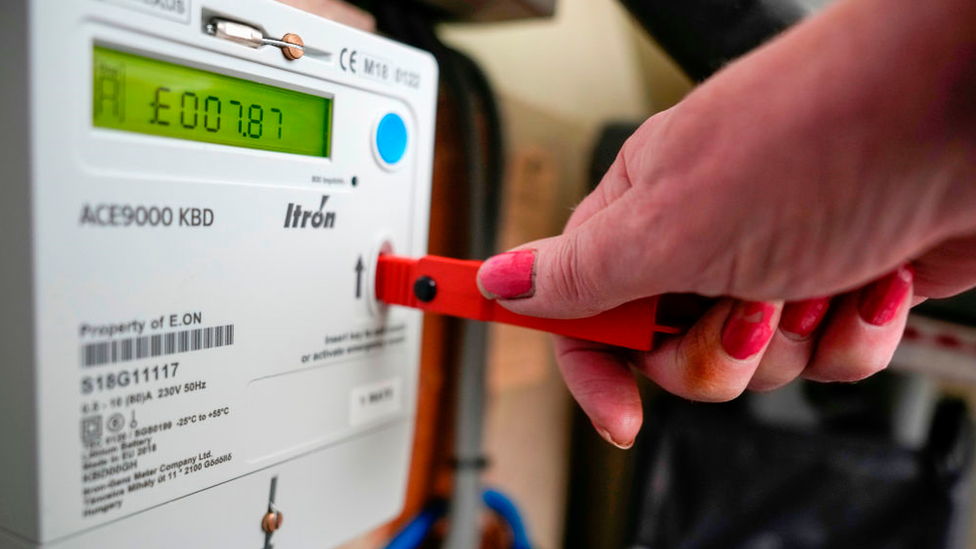Energy firms allowed to restart force-fitting prepayment meters
- Published
- comments

Energy companies have been granted approval to resume force-fitting prepayment meters in people's homes nearly a year after it was suspended.
EDF, Octopus and Scottish Power can install the meters again after meeting various requirements set by Ofgem, the industry regulator.
For years, energy companies were able to force-fit meters into homes when bills went unpaid.
But agents for British Gas were exposed installing them inappropriately.
They were forcing their way into the homes of vulnerable people, against Ofgem rules. The scandal emerged early last year after an investigation by the Times newspaper and led to a public outcry.
New rules
The meters were fitted (or smart meters automatically switched to prepay mode) when people did not pay previous bills, and there was no prospect of payment. It was designed to avoid further debts building up because these meters require gas and electricity to be paid for upfront.
Since February last year, no forced installation of meters have been allowed. Ofgem has since drawn up new rules that set out what suppliers are required to do.
Under the rules, meters should not be fitted:
When customers are over 75, unless someone younger also lives in the home
In households with children under the age of two
If anyone lives there with a terminal illness or certain conditions which would get worse in a cold home
Any company that breaks the rules would face enforcement action and unlimited fines. They would also be required to refit a standard meter within 24 hours and pay compensation.
"Protecting consumers is our number one priority," said Tim Jarvis, director general for markets at Ofgem.
"We've made clear that suppliers must exhaust all other options before considering forced installation of a prepayment meter, and consumers can help themselves by reaching out to their supplier as soon as possible if they think they won't be able to pay their bill, so payment options can be discussed.
"While nobody wants to see the practices uncovered last year repeated, we also know that allowing households to build up unsustainable amounts of debt isn't the right thing to do either."
Campaigners want a total ban on the force-fitting of prepayment meters. Such a ban would need to be introduced by government ministers.
Simon Francis, co-ordinator of the End Fuel Poverty Coalition, said: "It is outrageous that energy firms are seeking to use the courts to force people onto prepayment meters in the middle of winter.
"We still have grave concerns about the processes energy firms have in place for assessing vulnerabilities."
'Bigger bills'
The inclusion of Scottish Power on the new list of approvals comes after the firm was granted the first new batch of 124 warrants to fit the meters at Berkshire Magistrates Court, sitting in Reading, in October.
But Scottish Power later cancelled a few of the warrants when it emerged that mothers of children under two were among those subject to the warrants, with one mum having given birth just a few weeks before, according to an investigation by the Times in November.
A further hearing has been held since but in any case, even if warrants are granted, they cannot be acted upon until Ofgem give final approval. Scottish Power, EDF and Octopus have now been given that status.
Octopus said, despite the permission, it had no plans to start again.
"Even before the ban, Octopus had only ever carried out involuntary installations in extremely rare circumstances - indeed, we've only carried out 32 such installations, ever. In every case, customers had not paid anything for at least six months, and had refused to respond to at least 40 communications," a spokesman for the company said.
"As such, we currently have no plans to restart involuntary installations of prepayment meters."
A Scottish Power spokesman said: "While we have met Ofgem's strict criteria and been authorised to restart involuntary prepayment meter installations, where appropriate, this is always a last resort. Our focus will continue to be on supporting our customers to manage their debt and avoid the need for such action."
EDF said it was important to resume under strict supervision from the regulator.
"We have a duty to keep bills as low as possible, especially given customers are struggling, and rising debt levels are leading to all households facing bigger bills," a spokesman for the company said.
Ofgem is proposing lifting the energy price cap by £16 for a household with typical gas and electricity usage between April and March 2025, to cover unpaid debt levels among energy customers which has risen to £2.9bn.

What can I do if I can't afford my energy bill?
Check your direct debit: Your monthly payment is based on your estimated energy use for the year. Your supplier can reduce your bill if your actual use is less than the estimation.
Pay what you can: If you can't meet your direct debit or quarterly payments, ask your supplier for an "able to pay plan" based on what you can afford.
Claim what you are entitled to: Check you are claiming all the benefits you can. The independent MoneyHelper, external website has a useful guide.

- Published2 November 2023

- Published19 October 2023

- Published15 December 2023
